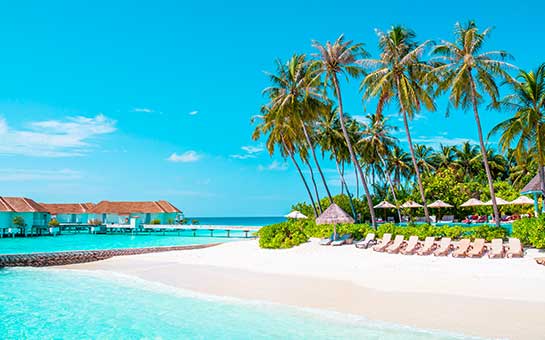The Maldives is an idyllic archipelago in the middle of the Indian Ocean. Somewhat unknown until recently, it has emerged as an unspoiled tourist destination. It may not have the charisma of Jamaica, but if you are looking to unwind and relax, there is no better place.
If you are traveling to the Maldives, you definitely need to buy travel insurance to protect yourself against any unexpected events that may occur during your trip.
Trip Cancellation Insurance for Travelers in Maldives – FAQs
You will likely have to book several flights to get to the Maldives. You’ll then need to book a hotel or resort, and reservations for events and activities. This is a lot of money to shell out upfront, and most of it will be nonrefundable. If you have to cancel your trip, the only way to get reimbursed for these expenses is with trip cancellation insurance.
Why should I get trip cancellation insurance for my Maldives travel?
Most statistics indicate that around 2% of international trips are cancelled each year. That might not sound like a large number, but the percentages won’t matter much when it happens to you.
In case of a cancellation due to personal health issues, a family emergency, natural disaster, or any other reason covered by the policy, trip cancellation insurance can reimburse you for your trip’s prepaid, nonrefundable expenses. It’s the only way to protect yourself from paying for a trip you’re unable to take.
What can be covered by trip cancellation insurance for Maldives?
When your travel plans go haywire, trip cancellation insurance, also known as travel insurance, can save the day. It can reimburse you in cases of trip cancellation, trip interruption, travel delay, lost baggage, unplanned emergency medical care, and more. You can even select add-on cancel for any reason coverage to give you more flexibility with certain plans.
The Maldives’ Most Popular Places for Travel
Hulhumalé
An artificial island off the east coast of Malé Atoll, Hulhumalé is known for its pristine beaches and elegant skyline. It has been designed to be a cozy urban sprawl in the middle of the ocean. No matter where you are, the coast is no more than a few minutes’ stroll away.
Maafushi
The traditional and laid-back Maafushi is the opposite of Hulhumalé. The fishing trawlers pull in here with their catch, and if you appreciate fresh seafood, there is no better place. It is also astonishingly cheap, and you could easily spend a week here without putting a dent in your travel fund.
Malé
The capital of Maldives and the seat of its government is also the largest atoll. Strangely enough, you won't find many tourists here, since they prefer to travel straight from the airport to their resort and give Malé a pass. It is quaint, and the nooks and crannies lead to pleasant surprises. The city is a mix of old Indian and Arabic architecture. The Island Bazaar is famous for selling souvenirs, and if you like to haggle, it is a wonderland.
Key Guidelines for Travelers in Maldives
The Maldives is a tropical paradise in more ways than one. Crime is almost non-existent in resort areas, and it is undoubtedly safe. However, as a tourist, you are in a foreign land, and unexpected incidents can happen at any time in any place. Keep the following points in mind before your visit.
- Crime outside of resorts – Most visitors to the Maldives stay at resorts, which are quite safe. However, should you choose to venture off resort grounds, you could be subject to petty crime such as pickpocketing, so stay aware.
- Timely travel – If you need to transit between islands, you’ll need to do so via seaplane or boat. Keep in mind that most of these services cease operations at sunset. Be sure not to get caught on a different island than your resort after dark, or you’ll be spending the night.
- Piracy – The threat of piracy and armed robbery of transiting boats still exists. Some pirates have been known to kidnap passengers and hold them for ransom.
Before You Travel to Maldives – Do This
- Avoid drug use at all costs – Maldives has strict laws involving illicit drug use. Even as a tourist, you could be subject to arrest and imprisonment if you violate them.
- Outside of resort islands, dress as the locals do – Keep your shoulders covered, and avoid tight-fitting clothing.
- Protect your finances from the uncertainties of international travel with travel insurance.
